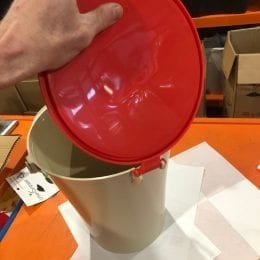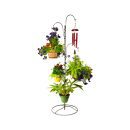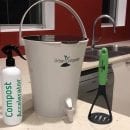
What can I compost in the Urban Composter?
All types of food scraps can be added. These include greens, meat, fish, citrus, dairy, coffee grounds, wilted flowers, egg shells and more. We recommend cutting up scraps into smaller pieces to allow for quicker fermentation. Make sure proteins such as meat and fish are thoroughly sprayed with accelerator. (no bones or excessive liquids).
When adding things like meat and proteins, we recommend adding a little sugar, then making sure they are covered (either with more food scraps or a paper towel). This helps to get the fermentation going faster.
How do I use the Urban Composter?
Cut up your food scraps and add them to the Urban Composter Bucket. Add a few sprays of Compost Accelerator onto the scraps every time they are added. Drain the juice from the bucket every few days. The juice can be diluted (1:100) with water and used as a fertiliser for the garden. It can also be drained into the sink as an organic drain cleaner. You can find more information on our website here.
Is the Urban Composter suitable for apartment living?
Even if you do not have a garden you can use our Urban Composter to reduce your food waste and so benefit your home and the environment. If you have a balcony mix the contents of the Urban Composter in a large tub of soil, then add to pots, buckets or planters. Place some top soil on top and leave for 6-10 weeks. This will turn into compost which will nourish other pot-plants.
If this is not possible, many councils have regular organic waste pick-up. As a last resort even if you put the contents in the garbage you have reduced the volume of your food waste by about 300%. As the food scraps have broken down in the Urban Composter there will be less negative impact of harmful gases going into the atmosphere. Plus you will have produced your own organic fertilizer which your plants will love.
You can also find neighbors to take your fermented food waste. Visit Sharewaste to find out more
What if my Urban Composter develops a strong offensive odour?
As you open the lid you would expect a fermentation smell (similar to pickled vegetables or a spoiled apple). You shouldn’t have smells when it’s closed
It is very important to drain the juice from your composter every few days to avoid any stronger smells. The liquid is concentrated. The acids react with the air and can make a strong smell if left to fester. Also check your tap isn’t blocked, this can cause a liquid buildup and subsequent smell.
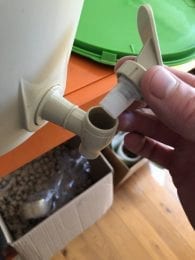
If your bucket has a decayed smell it may have spoiled – this is quite rare as the microbes added kills bad bacteria and prevents this. Black mould or a decayed smell is a sign of this, and is most likely due to neglect, no accelerator added, or spoiled food put in the bin. If this happens empty the bin, spray with some accelerator and bury. Make sure it is cleaned well with water and a small amount of detergent or vinegar. Don’t use harsh chemicals. Start your bin again, and make sure to follow instructions.
What happens when my bucket is full?
Ideally leave the scraps in your Urban Composter or City Composter for 2 weeks after filling, to ensure all food scraps are properly fermented. It can be less sometimes in certain conditions. Next ensure all the juice is drained, then bury the remaining pulp under soil, or place it in an outdoor compost bin or pile. The food scraps from your Urban Composter will continue to break down and will become humus in about 6-8 weeks. This compost can be used in garden beds or as a fertiliser.
Having two buckets is ideal. Fill one, let it sit while you fill the second, then empty when the second is full and repeat the cycle.
If you don’t have a garden, mix the scraps in a container equally with soil or potting mix. Once thoroughly mixed add to a pot, bucket or container (without drainage holes). Cover with dryer top soil and leave for 6-10 weeks (can vary on climate and conditions). Then plant into the container or use the conditioned soil on your garden.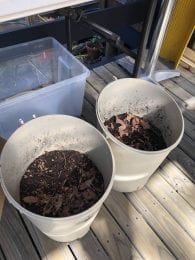
How should I clean by Urban Composter bucket?
It is important that you don’t use chemicals as this will kill the microbes in the accelerator spray. Any organic cleaner can be used to clean your City or Urban Composter bucket, or you can also use water mixed with vinegar or lemon juice.
Should maggots or flies appear in the Urban Composter bucket?
If the Urban Composter lid has been left open it is possible for flies to come in and lay eggs. This is more common in warmer climates and during summer months. Very quickly the fly eggs will turn into maggots. If this happens to you, don’t worry as they are still natural. You can wipe them away and continue composting. The acidic environment will prevent them from living too much longer. Make sure the lid is closed properly, and food isn’t left open on the counter to help prevent again.
If they bother you then empty the bucket and start again. Use water and possibly vinegar to clean.
How do the lids work?
The Urban Composter bucket lid is designed to be a snug fit but easy to open and close.
For the Urban Composter – The lid has three clips, one on the front and two on the back side. The lids seals on the inside ring. Make sure all three clips are pushed down. To open unclip the front and pull the lid open. The back clips will pop off with minimal force. The seal is designed to be just right, and not a strong vacuum which would be harder to open.
For the City Composter, The lid clips internally to the indented ring. Push down until it clips in (remember to do this each time properly). To open use the finger tabs to pry the lids up and pop off the ring. If you find the lid is hard to open try putting some vegetable oil around the top of the bucket where it contacts with the lid. With use the lid will soften and become easier to open.
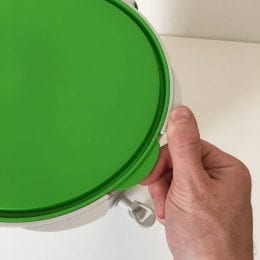
My Urban Composter bucket has a leaky tap
We endeavor to test the fit on all our buckets before shipping.
If the nut on the inside of the composter which the tap screws into has been inserted the wrong way, it won’t have pressure on the o-ring and leak. If this has happened, unscrew the tap, remove the nut, rotate it and put back in to a new position. The tap should now be snug when screwed in and no more leaks.
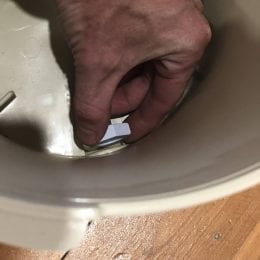
If the leak is from the tap itself: there may be food inside it, which can block and prevent it from closing. Unscrew the top half of the tap and flush it. We always recommend using a paper towel over the grate when you start a bin to prevent tap clogging.

A build-up of liquid should not be allowed to accumulate in the bottom of the Urban Composter. It is important to drain off the liquid every few days.
See our video which trouble shoots all tap issues;
I can’t get my City Composter lid back on
Make sure it’s the correct way around. With the slot facing upwards, as pictured below. Push the lid into the hinge until it clips.